Leading change
It's the humanity that we teach...
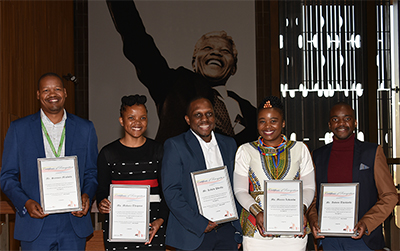
Following in the footsteps of Madiba: The names of six Unisans were submitted to News24 for their feature on 100 young Mandelas of the future: Samson Mapheto (compassion), Mabora Thupana (compassion), Kabelo Pheeha (visionary), Marcia Lebambo (compassion), Andani Thakhathi (leadership), and Suvania Naidoo (visionary) (absent from photo). Two of these amazing under-35 Unisans made the cut and feature on the list of the top 100 Mandelas of the future—Marcia Lebambo and Kabelo Pheeha.
“Our legacy is determined by our humanity or lack thereof.” Prof Maggi Linington, Executive Dean of the College of Agriculture and Environmental Sciences (CAES), said at Unisa’s celebration of what would have been Nelson Rolihlahla Mandela’s 100th birthday on 18 July 2018 that future generations would not remember what we invented, how many patents we published, or how many students passed, important as these might be. “They will remember how we did it…They will remember our compassion…It’s the humanity that we teach that makes us leave a legacy.”
In similar vein, Prof Mandla Makhanya, Principal and Vice-Chancellor, alluded to the humanity and wisdom that set the former president apart from his peers. These were, he said, the qualities that gained him universal admiration and respect, and that turned those who met him into star-struck admirers who were inevitably overwhelmed by the charisma, power, humility, and warmth that he exuded. “No-one felt excluded or ‘lesser’ in any way in the company of this singular human being, and it is this spirit of inclusion and genuine love for his fellow men and women that continues to be reciprocated in remembrance and emulation through events such as the ones which we are holding today.”
Showcasing social transformation
It was to honour the humanity and service of Nelson Mandela that Unisa’s Department of Institutional Advancement (DIA) and the Division of Community Engagement (CE) hosted a special commemoration of his life and work by showcasing the university’s involvement in sustainable development, nation building, and social justice.
In her opening address, Dr Genevieve James, programme director and CE head, said that while the call for 67 minutes of service encouraged volunteerism, it did not necessarily highlight the long-term commitment to service, development, and active citizenship that was required for the betterment of society.
“Therefore, at Unisa,” she affirmed, “the primary objectives of Nelson Mandela Day are to share the vision of higher education as a vehicle for social transformation and to encourage greater community engagement and sustainable development consciousness and action among Unisa stakeholders.” James said that active partnerships between government, business, civil society, and higher education could produce the development results needed to advance South Africa’s democracy.
Embodying Mandela’s characteristics
When News24 started a search among its readers for 100 young South Africans who embodied the characteristics Mandela was best known for, Unisa’s Council requested that an institutional call go out to find suitable candidates who were following in Madiba’s footsteps. Six names were submitted and the event highlighted the singular achievements of Marcia Lebambo (compassion), Samson Mapheto (compassion), Suvania Naidoo (visionary), Kabelo Pheeha (visionary), Andani Thakhathi (leadership), and Mabora Thupana (compassion).
Two of these amazing under-35 Unisans made the cut and feature on the list of the top 100 Mandelas of the future—Marcia Lebambo and Kabelo Pheeha (Row 9, numbers 2 and 8).
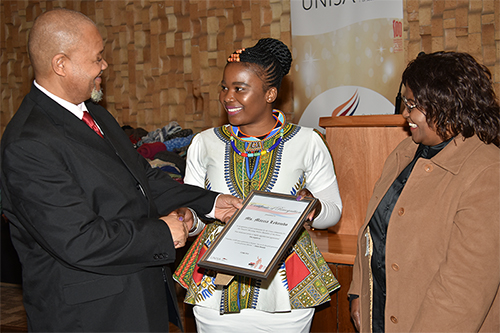
Prof Mandla Makhanya (Principal and VC) and Nosisa Mokoka (Unisa Council) congratulate Marcia Lebambo (centre) on being chosen as one of News24’s 100 young Mandelas of the future.
Knitwits and happy hookers
Dr Marcia Socikwa, Vice-Principal of Operations and Facilities, told the audience that Nelson Mandela Day was a call to action for individuals everywhere to take responsibility for changing the world into a better place, one small step at a time. In that spirit, she said, and to celebrate the university’s 145 years of existence, more than 50 Unisans took action by either knitting or crocheting or by providing scarves or fabrics to help the university reach its goal of donating 145 scarves to the Tshwane Leadership Foundation (TLF), a registered Unisa community project.
To enhance community spirit, these crafters came together once a week to knit or crochet together in groups during their lunch hours, she said. They used their skills to teach newbies the techniques. Many Unisans also donated wool, knitting needles, crochet hooks, and fabrics, or gave completed scarves.
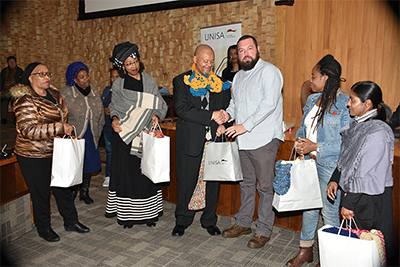
On the right, Wayne Renkin, Getrude Chahwanda, and Manisha Ramnarain received the scarves on behalf of TLF from Unisa’s Khanya Mahlare (ED: DIA), Dr Marcia Socikwa (VP: Operations and Facilities), and Prof Mandla Makhanya (Principal and VC). The TLF was launched in 1993 and is committed to model innovative social change and a high degree of social inclusion in the capital city of South Africa. It works towards healthy urban communities that are socially inclusive and viable, and towards a policy environment that would enable social attachment and human rights protection.
“It is with great pleasure that I can announce that we have exceeded our goal and are currently sitting on 245 scarves. The initiative will stay open for 2018 and perhaps, by the end of the year, we can reach 1 000 scarves,” enthused Socikwa.
Hermina Nel of the DIA and Laura Schultz of the Department of Study Material, Production, and Delivery, who drove the initiative, introduced two of the Unisans who took part in the project: Debra Mashabela, who works in one of the Muckleneuk cafeterias operated by Empilweni Food Specialists, and Meisie Senabe from the CE project of the Department of Life and Consumer Sciences in CAES.
“The aim of the project was not just to knit; it was caring,” said Mashabela. One of the scarves had been specifically earmarked for the VC, she revealed, and she wrapped it around his neck with a flourish. Senabe said that it had brought the CE project together as a team. “Through knitting we came together as a family,” she asserted. Although they had only started the preceding Monday, the members of the project had whipped out their needles to great effect and had by Mandela Day already knitted ten scarves.
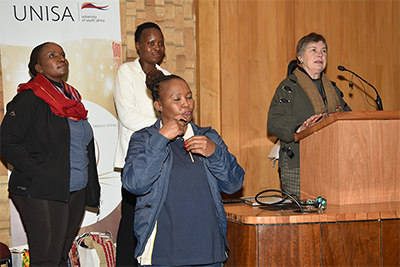
Meisie Senabe (DLCS), Debra Mashabela (Empilweni Food Specialists), Sophy Mabaso (sign language interpreter), and Laura Schultz (DSMPD) explain how the scarf project came into being and what it meant to the participants.
Coffee—grounds for hope
Prof Solomon Magano, Acting CAES Deputy Executive Dean and Director of the School of Agriculture and Life Sciences, shared that the Department of Life and Consumer Sciences CE project offered short courses in areas such as nutrition, food, health, baking, barista skills for the deaf, and sewing techniques. “The primary goal of these courses is to provide skills training for empowering people, especially the deaf community and women.”
In 2018, the project had focused particularly on two of the project deliverables, he said, the sewing technique workshops presented to women of The Potter’s House community in Sunnyside, a TLF project, and barista skills training to deaf students, a feature that was conducted jointly with the Ciro Coffee Academy.
Magano disclosed that under the championship of Dr Tertia van Eeden, the barista project had made great inroads into the coffee culture in South Africa, and since 2017, companies such as Spar, Investec, Deloitte, Microsoft, PWC, Protea Hotels, Ciro, and Kauai had employed some of Unisa’s trained deaf baristas.
He then called on one of the recent graduates, Mduduzi Lukhuleni, who shared through sign interpreter Sophy Mabaso how the Unisa Barista Skills Course for the Deaf Community, presented in collaboration with the Ciro Coffee Academy, had changed the lives of the deaf students. “Thank you so much for helping us,” he signed.
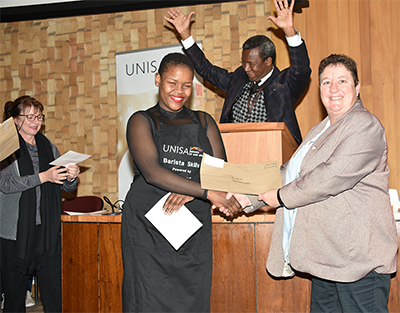
Dr Tertia van Eeden (Deaf Barista Skills Course champion), Dineo Ramasodi (deaf barista), Prof. Solomon Magano (acting Deputy ED: CAES and Director: School of Agriculture and Life Sciences) leading the signed cheering, and Prof Maggi Linington (ED: CAES) |
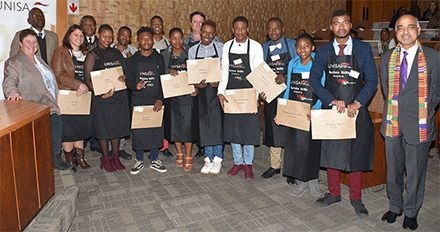
Back left, Prof Sogolo Lebelo (CoD: Life and Consumer Sciences) and Prof Solomon Magano (acting Deputy ED: CAES and Director: School of Agriculture and Life Sciences), and, front left, Prof Maggi Linington (ED: CAES) and, front right, Prof Iqbal Jhazbhay (former SA Ambassador to the State of Eritrea from 2012 to 2016) with baristas who received their certificates for successfully completing the Unisa Barista Skills Course for the Deaf Community. |
Certificates for the course were presented to Louisa Bruyns, Harold Hlope, Monica Jiyana, Itumeleng Kgatuke, Sonia Lefakgomo, Mduduzi Lukhuleni, Mulalo Madega, Kamogelo Madisa, Yongama Makhubalo, Sannah Maleke, Tshiamo Matlapeng, Zimkita Mbhiyazo, Pretty Mbulawa, Lerato Moabelo, Velly Moremi, Rachel Moshoete, Keogile Mphela, Pfunzo Netshikweta, Vusimuzi Nzapheza, Michael Oosthuyzen, Thabiso Pheelwane, Charmaine Pheno, Dineo Ramasodi, Irene Soli, Oagile Tau, Louisa Visagie, and Simone Visser.
James concluded the celebration by thanking the sponsors of the event, Ciro Coffee Academy for organising the coffee bar, NOVON Crop Protection and Khayelitsha Cookie Company for the biscuits, Water 62 for bottled water, and Unisa’s own caterer, Empilweni Food Specialists, for tea and magwinya (deep-fried doughnuts) to complement the coffee and cookies.
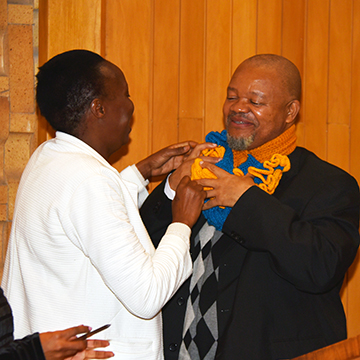
Debra Mashabela (Empilweni Food Specialists) presents Prof Mandla Makhanya (Principal and VC) with his own stylish hand-knitted scarf. |
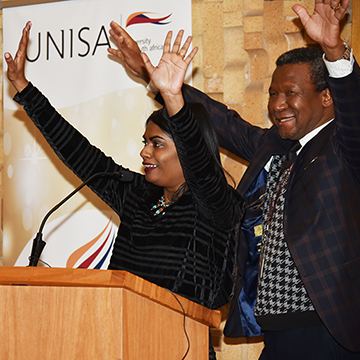
Dr Genevieve James (programme director and Head: CE) and Prof Solomon Magano (acting Deputy ED: CAES and Director: School of Agriculture and Life Sciences) teach the audience how to applaud in sign language. |
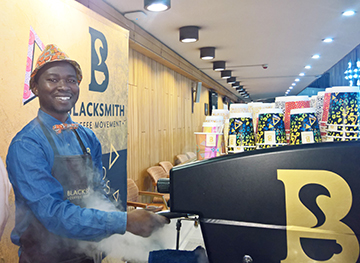
Louis Monareng (Ciro Academy trainer) is steaming to serve the hordes craving a shot of espresso. |
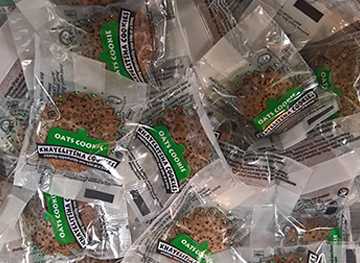
If you think cookies can’t make the world a better place, just ask the previously unemployed women of the Khayelitsha Cookie Company, who for the past eight years have spent their days baking all kinds of delicious cookies in the hope of doing exactly that, and, in the process, providing a better life for their children. The company started in 2004 in the Nbuntu training centre in Khayelitsha. From there the company relocated to Ndabeni in 2006 and since then expanded to occupy three units in a business park in Ndabeni. Staff numbers increased from two ladies in 2004 to 45 staff currently. |
|
Prof Mandla Makhanya, Principal and Vice-Chancellor Speech |
Thabo Mbeki, Unisa Chancellor Speech |
|
|
English | SeTswana | Northern Sesotho | Sesotho | Afrikaans | isiZulu | isiXhosa | SiSwati | XiTsonga | TshiVenda | isiNdebele
|
English | SeTswana | Northern Sesotho | Sesotho | Afrikaans | isiZulu | isiXhosa | SiSwati | XiTsonga | TshiVenda | isiNdebele |
English | SeTswana | Northern Sesotho | Sesotho | Afrikaans | isiZulu | isiXhosa | SiSwati | XiTsonga | TshiVenda | isiNdebele |
*By Sharon Farrell
Publish date: 2018-07-19 00:00:00.0


 Black industrialist and founding CEO of Capebio to deliver keynote address at Innovation Festival
Black industrialist and founding CEO of Capebio to deliver keynote address at Innovation Festival
 Unisa connects with Giyani community to define tomorrow
Unisa connects with Giyani community to define tomorrow
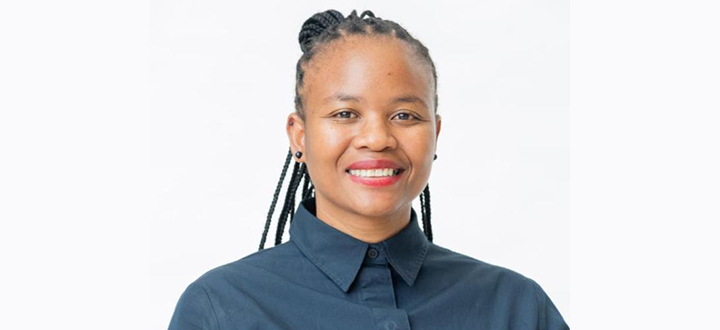 Dr Nasiphi Moya to give keynote address at Unisa Innovation Festival
Dr Nasiphi Moya to give keynote address at Unisa Innovation Festival
 Unisan pens a personal and moving reflection on Luthuli's legacy
Unisan pens a personal and moving reflection on Luthuli's legacy
 Unisan's PhD research paper lauded at international conference
Unisan's PhD research paper lauded at international conference